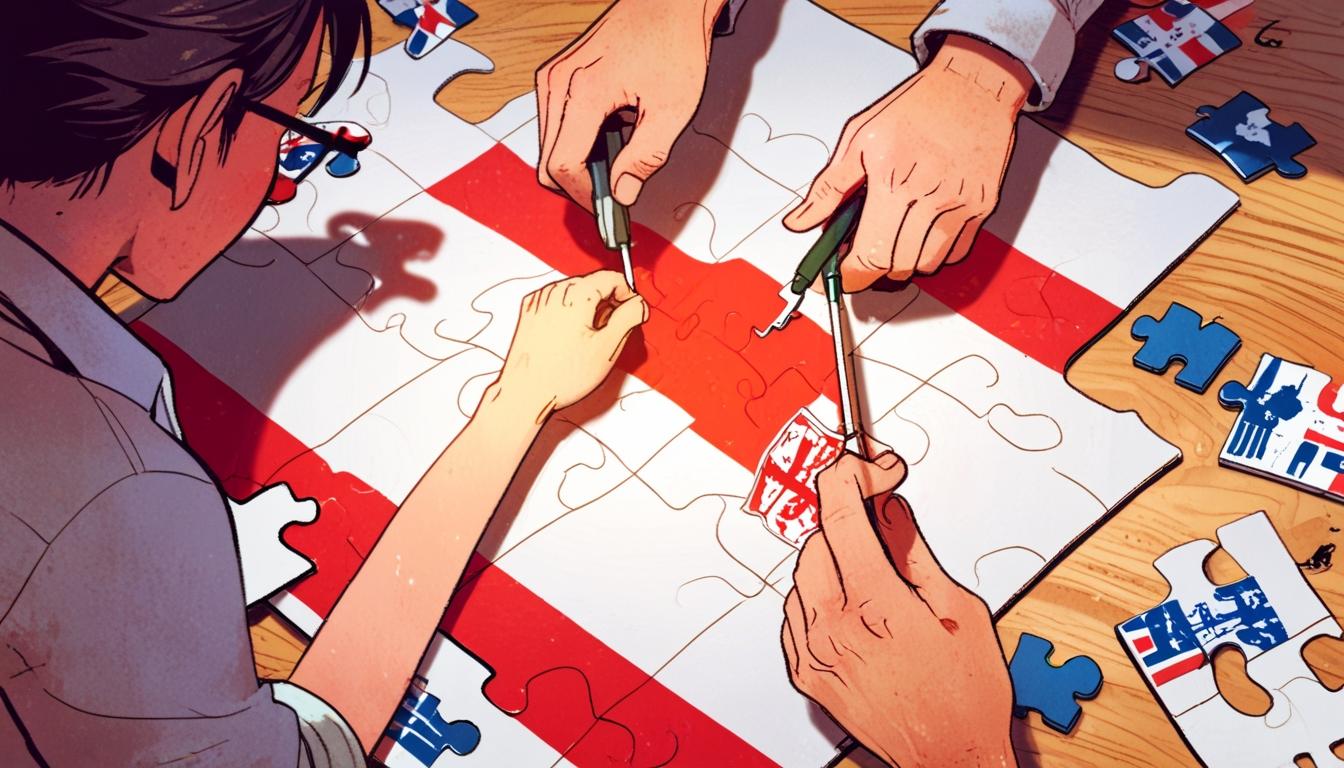The recent decision by Gibsons Games to alter Mike Jupp’s popular jigsaw puzzle, I Love Spring, has sparked a vivid debate about the implications of a 'woke' culture on traditional products. Once touted as the company’s “most profitable” puzzle, it now faces significant changes aimed at addressing perceived offensiveness. Jupp’s original artwork, which features the St George’s flag prominently, has been modified under the guise of aligning with company values that deem such symbols inappropriate. The irony here is palpable, especially considering the timing of these revisions coincides with St George’s Day, a day that holds cultural significance for many in England.
Jupp has expressed his frustration at the changes. According to the cartoonist, the alterations included uncomfortable edits to various whimsical scenes, such as replacing a cartoon baby resting on a bin bag with a fox—changes that he views as both disrespectful and absurd. He laments, “Telling a cartoonist how to depict humour is as disrespectful as it is infuriating,” highlighting the tension between creative expression and corporate sensitivity. After being pressured to revise not just I Love Spring but also his other works, Jupp made the decision to sever ties with Gibsons, leading to a dramatic 90% drop in his income.
This situation reflects a broader trend in consumer products and the arts, where perceived sensitivities can prompt companies to modify or censor creative works. Critics of this trend often argue that it undermines artistic freedom while simultaneously alienating consumers who appreciate the original narratives and humour. Jupp’s experience is a case in point; while his puzzle has become a collector’s item, the revisions undertaken by Gibsons speak to a shift in how we discuss and engage with cultural symbols.
In the realm of public life, Sarah Fosmo’s recent appointment as chief of staff to Prince Harry and Meghan Markle adds another layer of complexity to the ongoing narrative surrounding the Sussexes. The couple's efforts to establish a distinctive global brand have faced challenges, including a high turnover of staff within their household—a situation further complicated by their ambition to carve out a niche in philanthropic and humanitarian efforts.
Fosmo, who has previously worked for Bill Gates, brings a wealth of experience in managing high-stakes operations. However, her role raises questions about the practicalities of supporting the Sussexes' ambitious agenda—will she be facilitating their transition into a more grounded outreach, or will the demands of their lifestyle present insurmountable challenges? Observers are left to ponder whether such high-profile appointments ultimately reinforce or undermine the couple's objectives.
On a starkly different note, society continues to grapple with the repercussions of human recklessness when it comes to wildlife. A recent tragic incident involving a lion in Iraq—where the animal mauled its owner—serves as a grim reminder of the folly in attempting to tame dangerous creatures. The absurdity of these situations prompts a deeper reflection on human instinct, with some commentators suggesting that perhaps it's not the animals but rather the humans who exhibit a troubling lack of judgement.
Moreover, while issues like animal safety and preservation might seem familiar, they contribute to a larger landscape of cautionary tales about our relationship with nature. Unfortunately, not all individuals learn from such tales, resulting in preventable tragedies that reflect poorly on human decision-making.
Lastly, the escalating costs of caregiving in the UK underscores an urgent societal issue. With care fees skyrocketing due to external economic pressures, including rising utility costs and government policy changes, families find themselves wrestling with the challenge of affording quality care for loved ones. For many, the prospect of managing dementia or other long-term health conditions becomes a battle not only against the disease but also against a financial tide that is increasingly difficult to navigate.
The interplay of cultural sensitivities, personal choices, and economic realities offers a window into the complexities of contemporary life, where nostalgia for simpler times often clashes with a rapidly shifting social landscape. As individuals navigate these challenges, the ongoing discussions around art, public service, human intelligence, and care underscore a collective need for balance—between innovation and tradition, sensitivity and humour, and care and cost.
Reference Map
- Paragraphs 1-3: [1]
- Paragraphs 4-6: [1], [3], [4]
- Paragraphs 7-8: [1], [6]
- Paragraphs 9-12: [1]
- Paragraphs 13-15: [1]
- Paragraphs 16-18: [1]
- Paragraphs 19-20: [1]
Source: Noah Wire Services
